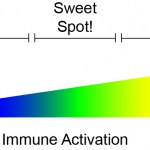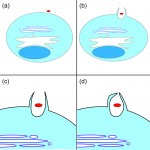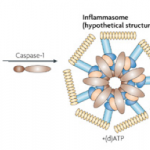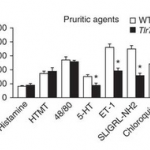Pattern Recognition
Every time I see an ad for some remedy that "Helps BOOST the Immune System!" I die a little inside. It's not just that these products are often homeopathic bull*, but (as I've mentioned before), boosting the immune system can actually be a terrible idea. The immune system is a finely tuned instrument, and too much can be just as bad too little. Too much immune activation leads to allergies and autoimmune disorders like multiple sclerosis (MS) or lupus. We don't know exactly why, but the prevalence of these "hyperinflammtory disorders," where the immune system is over-…
For this week's OAS Wednesday, I thought I'd try to highlight some research that's in my field. As a result, I will likely be more prone than usual to lapsing into jargon and assuming knowledge that I shouldn't (or maybe I'll over-correct and get too simplified). Please let me know if anything needs clarification.
In real estate, they say that the three most important things to consider are location, location and location. The same could probably be said about many aspects of biology, including the immune system - if you get a cut on your toe, you don't want inflammation in your kidney.…
Monday's announcement for the Nobel Prize in physiology or medicine should have been a happy occasion for my lab. On the one hand, it was given for early discoveries in the field of innate immunity - my field! On the other hand, it was given to a scientist that many* feel is undeserving of the honor, while at the same time sullying the legacy of my scientific great-grandfather.
Let me explain.
The Context
In the late 1980's, immunologists were riding high. Much of the experimental attention in previous decades had focused on T-cells and B-cells, the drivers of "adaptive immunity," and it…
Christie Wilcox has a great post over at Science Sushi about why scientists should be on social media. I don't disagree with anything she says, and I try to do it myself (see: the twitter and G+ links to the left... I also recently signed up for tumblr which is kind of fun). But sometimes the social media is just the first step.
Last night I, along with fellow graduate students Sky Brubaker and Jillian Astarita, gave a lecture for the Science in the News lecture series about how an immune response gets started. The SITN fall lecture series is something I've done for the past few years, first…
For anyone in the Boston Area, two of my colleagues and I will be giving a talk on how the immune system recognizes and responds to pathogens, and how understanding this will allow scientists to design better vaccines and more effectively treat illness.
How to Spot a Virus: The origins of an immune response.
This lecture series is aimed at a general audience and it starts at 7pm tomorrow (Wednesday) night at Armenise Amphitheater at the Harvard Medical School. Come watch! (and stop by to say "hi" afterwards).
----
Full schedule:
SITN archives.
Last year's lecture series on Vimeo.
I've said it before, and I'll say it again - pathogens are devious little bastards:
Discovery of a Viral NLR Homolog that Inhibits the Inflammasome
In order to respond to a virus, a cell first has to recognize that it's there. There are a lot of ways the cell tries to do this - some receptors (like the TLRs I study) look for features that are unique to pathogens that are outside the cell. Others look for molecules (like DNA and RNA) that are shared between us and pathogens, but are in the wrong place (DNA outside the nucleus is a pretty sure sign of infection).
NOD-like receptors (that's the…
If you've ever rolled your ankle (as I have many times), you have a visceral knowledge of inflammation. Clinically, inflammation is the redness, swelling, heat and pain that's associated with injury. From an immunologist's perspective, it's the set of molecular events that get the immune system going. All of the clinical systems associated with inflammation are due to increased vascular permeability, which is just a fancy way of saying leaky blood vessels. Actually, "leaky" implies that it's uncontrolled, when in fact there's a very orchestrated set of events that recruit immune cells and…
This week, I'm going to take a break from vaccines and do some innate immunity. Today's topic: the provocatively named "Inflammasome." This Nature Review from last month focused on inflammasomes and anti-viral immunity, but I think the inflammasome itself needs its own post.
A breakthrough in our understanding of the mechanisms that control the activation of inflammatory caspases came from the identification and characterization of the inflammasome, a large (~700 kDa) multiprotein complex that recruits inflammatory caspases and triggers their activation. Inflammasomes are often defined by…
Normally, I would feel woefully unqualified to analyze a Nature Neuroscience paper, but I'm going to do it anyway. How could I pass it up? It features a Toll-like receptor!
Toll-like receptors are typically expressed in immune cells to regulate innate immunity. We found that functional Toll-like receptor 7 (TLR7) was expressed in C-fiber primary sensory neurons and was important for inducing itch (pruritus), but was not necessary for eliciting mechanical, thermal, inflammatory and neuropathic pain in mice.
TLR's are on the front lines of immune defense. They are present on many cells types,…
I have a love/hate relationship with Nature Reviews: Immunology. It comes out once per month, and is usually packed with easy to read articles about fascinating (to me) topics, and each is filled with tons of great references so I can dig into the issue more. On the one hand, I get really excited about all the great things to read and new ways to expand my knowledge. On the other hand - that's a lot of reading. My Instapaper queue is about 80% Nature Reviews (15% other papers, and 5% random crap).
This month is no different, but I decided to have the goal of blogging about the ones that I…
[I've been hooked on the immune system since I was a kid and my dad showed me electron micrographs of macrophages eating bacteria in Scientific American. Now that I'm in graduate school studying immunology, and macrophages in particular, my dad asked if I could give a play-by-play of an immune response. Here you go Dad:]
Part 3: Immune memory
Towards the end of the 18th century, Edward Jenner did an experiment. It had long been known that people who had been infected with smallpox, if they managed to survive (no easy feat), would be resistant to further infection. People would even give small…



